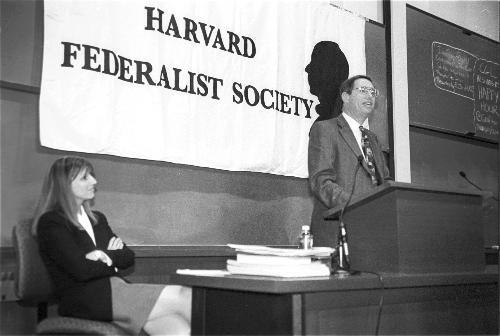
University of Chicago law professor RICHARD EPSTEIN argues from the podium last night during his debate with Harvard Law School professor CHRISTINE JOLLS on the costs and benefits of anti-discrimination laws.
Two experts in employment law squared off yesterday on the benefits of anti-discrimination laws, attracting overflow crowds to their debate at Harvard Law School.
Richard Epstein, a professor of law at the University of Chicago, argued that a free market will naturally eliminate discrimination.
Christine Jolls, professor of employment and contract law at Harvard Law School, countered that the market had failed and laws were necessary to eradicate discrimination.
Epstein argued that a free and open legal system will counter discrimination more effectively than one that is based upon formal laws against discrimination.
“Laws that restrict employment practices only induce more strategic forms of discrimination,” he said. “If you can’t fire someone because of his race, you’ll be more reluctant to hire him.”
Epstein also maintained that laws dictating the racial or ethnic make-up of firms also make it more difficult for people to freely enter into the employment cycle.
He said the market will naturally lead firms away from discriminating and hiring from only one group. Because the consumers who patronize businesses are themselves diverse, businesses will only stay competitive by reflecting their market.
“Restricting hiring practices to a fraction of the population is an invitation of suicide,” he said. “Firms that discriminate just won’t survive.”
Epstein closed his arguments by maintaining that formal laws against discrimination are also impractical and difficult to define and enforce.
“You ultimately end up with a laundry list of laws attempting to combat gender, age, and racial discrimination,” he said. “The list grows longer and longer, while the enforcement of these laws doesn’t get any easier.”
But Jolls said pervasive discrimination still exists in America despite the workings of a free market.
She cited one study in which women auditioned for elite symphonies around the country.
When they auditioned behind a screen and their sex was unknown, they were more likely to be hired.
“In a world so obviously plagued by discrimination, the legal system cannot stand by as a silent giant, but must actively combat discriminatory practices,” she said.
Jolls also pointed to studies of past anti-discrimination laws such as the Civil Right Acts of 1964, which show that active policies effectively reduce hiring discrimination.
In his rebuttal, Epstein argued that the evidence presented by Jolls was ambiguous.
“Empirical evidence from a single study isn’t basis for policy affecting a complex employment market,” he said. “There are other ways of ensuring a diverse workforce without the restrictions of formal laws.”
Jolls responded by saying empirical evidence should be the final arbiter in setting policy.
“We can’t view people behind screens in most cases,” she said. “There is a need for anti-discrimination laws.”
The debate was sponsored by the Harvard Federalist Society, a non-partisan group that encourages debate of legal issues on campus.
Read more in News
Students Serve Up Pizza, Advice












